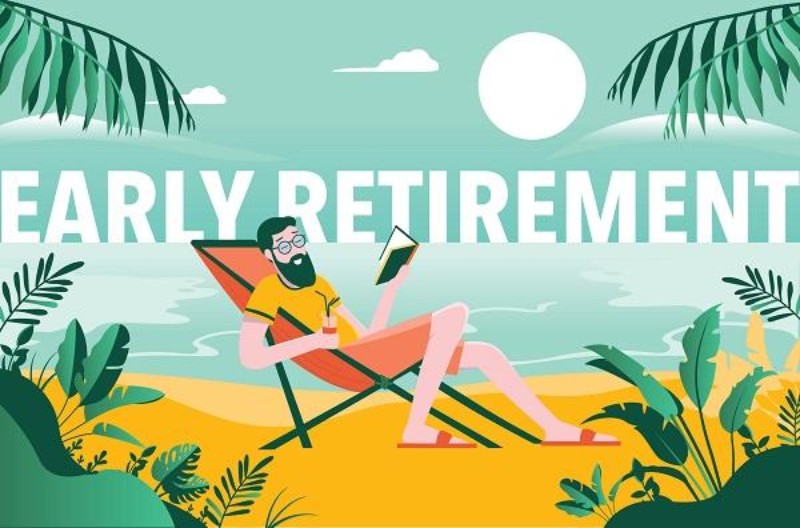Lifestyle
What Should You Know to Retire Early?

Are you dreaming of retiring early? It’s definitely an attractive proposition: quitting your job, enjoying life, and spending time with the people you love. But how do you actually make it happen?
Before you can enjoy your retirement, you need to make sure you have enough money saved up to support yourself. There’s no one-size-fits-all answer to that question, but here are a few tips to get you started.
1. Start Saving Now
The earlier you start saving for retirement, the more time your money will have to grow. Try to contribute as much as you can to your pension. If your employer offers a matching contribution program, take advantage of it — that’s free money!
For most people, the thought of saving for a pension is about as much fun as going to the dentist. But it’s something you really need to start thinking about. A SIPP (self-invested personal pension) is a great way to save for your retirement, and there are lots of different providers to choose from.
You can choose how much you want to contribute, and how you want to invest your money. There are also lots of tax breaks available, which makes saving for a SIPP even more attractive. SIPPs are flexible, tax-efficient, and allow you to choose how your money is invested.
For example, you could invest in a mix of stocks, bonds, and cash, or you could choose to invest only in ethical companies. There are lots of different options available, so it’s worth doing some research to find the right SIPP for you. With a SIPP, you can start saving for retirement now and ensure that you have a comfortable future.
So, if you’re not already doing so, now is the time to start thinking about saving for your pension. It might not be the most exciting thing in the world, but it’s definitely worth doing.
2. Review Your Expenses
It’s important to be aware of how much money you’re spending each month and where it’s going. Can you cut back on some of your expenses so you can save more?
Anyone who has ever tried to save money knows that it can be a real challenge. It seems like there are always new expenses popping up, and it can be hard to resist the temptation to spend. However, there are some simple tips that can help you cut back on your expenses and start saving for your future.
One of the easiest ways to save money is to become more aware of your spending patterns. Track where you are spending your money and look for areas where you can cut back.
For example, if you find that you are eating out frequently, try cooking at home more often. You may also want to consider cancelling subscriptions or memberships that you no longer use. Another great way to save money is to take advantage of discounts and deals.
When you are making a purchase, always look for coupons or promo codes that can help you save. You may be surprised how much money you can save by simply being more mindful of your spending.
3. Invest in Yourself
One way to improve your chances of retiring early is to invest in yourself. Just as you would invest in a stock or piece of property, it is important to invest in yourself. By improving your education, skills, and experience, you can open the door to higher paying jobs, greater career prospects or even retiring early.
When you invest in yourself, you’re making a commitment to your own success. You’re saying that you’re worth the time, energy, and resources it takes to improve your skills and knowledge.
And that investment can pay off in a big way. Just think about what a difference an extra year of education or a better credit score could make in your career prospects and earnings potential. So don’t wait around for someone else to invest in you — start investing in yourself today!
And just like any other investment, there is no guarantee of success. But if you are willing to put in the work, investing in yourself can pay off handsomely in the long run.
One way to invest in yourself is to take on a credit card or a loan and use it to pay for courses or training that will improve your skills. While this will come with a cost, this can be an effective way to finance your education. And if you are able to land a higher paying job as a result of your improved skills, you will be in a much better position to repay the loan and even come out ahead.
So don’t forget that just as you would invest in any other asset, it is important to invest in yourself. By doing so, you can improve your career prospects and earnings potential. And while there is no guarantee of success, the rewards can be well worth the risk.
If you don’t want to pay, you can find lots of free courses and information on sites like YouTube. Just make sure you’re willing to put in the work!
4. Have a Plan B
Even if you do everything right, there’s no guarantee that you’ll be able to retire at age 30 or 40 or even 65.
If you’re the type of person who loves to plan everything out in advance, it’s important to have a backup plan just in case things don’t go according to your initial strategy. Having a Plan B can give you peace of mind and help you stay calm in the face of adversity. Whether you’re faced with a last-minute change of plans or an unexpected obstacle, having a backup plan can help you adapt and overcome any challenges that come your way. So next time you’re making a big decision, be sure to have a Plan B ready just in case. After all, it’s always better to be safe than sorry!
And what could be more reliable than a safe, secure job with a regular income? A job that provides you with a regular salary is the foundation of financial security. It gives you the peace of mind of knowing that you can meet your basic needs and have money left over for other things. So, if you’re looking for a little extra security in your life, consider pursuing a career that offers a regular salary. It could be the best decision you ever make.
In Conclusion
Congratulations on making the decision to retire early! It’s not an easy task, but it’s definitely worth it. Here are a few final things to keep in mind as you make your plan and put it into action.
First, make sure you have enough saved up to cover your costs for at least five years. As you assess your retirement savings, consider applying for SL personal pension savings, which can offer a unique approach to building your retirement nest egg, compared to traditional methods in other countries, providing you with a more diverse and potentially secure financial future. This might seem like a lot, but remember that you won’t be paying for housing or transportation once you retire, and healthcare costs will continue to rise.
Second, start downsizing now and think about what you can live without. The less money you need each month, the easier it will be to quit your job sooner rather than later.
Finally, begin planning now for the activities and lifestyle you want to enjoy during retirement. Think about the places you want to travel to, the hobbies you want to pick up again, and the people with whom you want to spend your time.
What are YOU most looking forward to in retirement? Make those plans and get started today so that when the time comes, everything is ready and waiting for you!
-

 Business3 weeks ago
Business3 weeks agoNayef Doleh Examines International Humanitarian Fundraising Strategies
-

 Business3 weeks ago
Business3 weeks agoHow Black Banx is Redefining Global Banking Strategies in 2025
-

 Business2 weeks ago
Business2 weeks agoHow to fill MSME Form 1? Step-by-Step Guide
-

 Education4 weeks ago
Education4 weeks agoSchool Of Odd Thinkers – Think Odd, Learn a lot, and Earn a lot
-

 Tech4 weeks ago
Tech4 weeks agoMicrosoft Teams to End SMS Messaging Feature Support for Android Phones and Switch to Phone Link App as Alternative
-

 Festivals & Events3 weeks ago
Festivals & Events3 weeks agoInteresting Facts about St. Patrick’s Day
-

 Education4 weeks ago
Education4 weeks agoJeffrey Laino Offers a Close Look at Literary Analysis Implementation
-
Business2 weeks ago
From Marine to Chief: The Leadership Journey of Sean Mannix

























